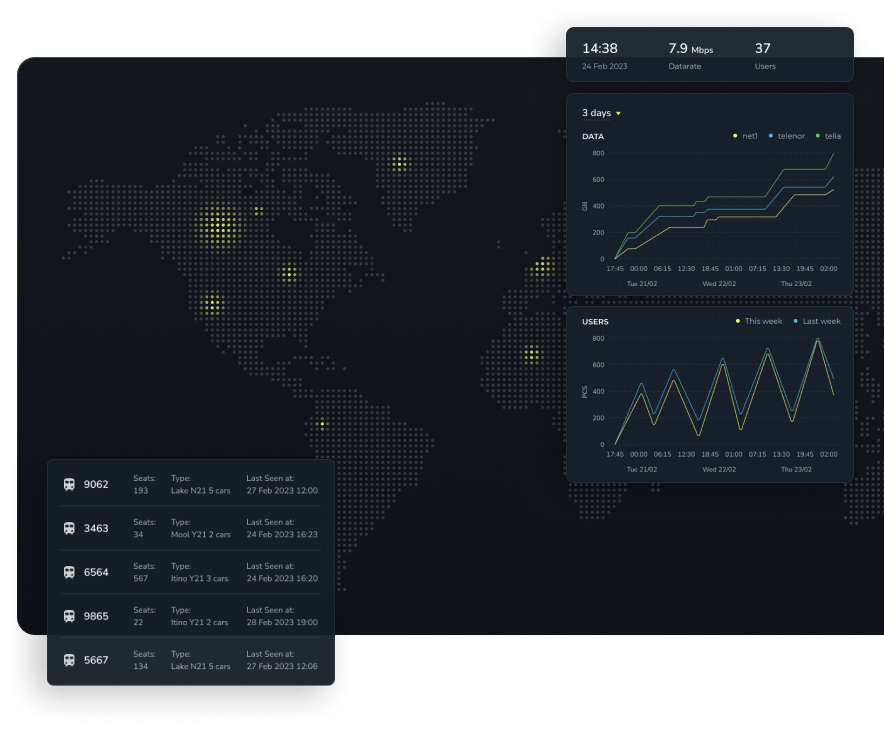The modern landscape of the transportation industry is undergoing major changes under the influence of advanced technologies. More and more intricate tech tools emerge that expand common business opportunities. This is a constant trend for the next decade, at least, because the fourth technological revolution is only gaining momentum. One of its brighter cases we can see in the emergence of the IoT in fleet management.
The volume of this novel market will double in five years, reaching $26.5 billion in total shares! This means that there will be more companies using modern management methods and platforms through which technology allows them to achieve better business results.
At Requestum, we possess rich experience in software development. In this feature, we share our own vision of the prospects for the IoT in Fleet Management from both technological and business perspectives to guide you in your choice of only the best solutions.
Discover the process of developing a GPS vehicle tracking system
What Are IoT Fleet Management Solutions Used for?
The concept of using smart devices allows you to increase the efficiency of managing large transport assets and structures by automating processes. Companies get the opportunity to reduce the number of employees because a proper digital tool allows you to remotely:
- Monitor the status of vehicles and manage smart sensors from anywhere, at any time;
- Manage security;
- Optimize business processes through real-time tasks (e.g., routing, consulting, etc)
The use of wireless M2M technologies leads to a reduction in accidents, makes supply chains more stable, improves working conditions for personnel, and, in general, sharpens the competitive edge of an enterprise.
How Can a Fleet Run With the IoT?
The IoT fleet management solution uses both simple telematics and more sensitive and accurate electronic devices to enable automated remote management and full-fledged real-time analytics. Using the cloud, the complex system provides real-time management of all necessary information. Tasks are performed easier and faster with the following features of specialized platforms and systems.
Data collection and management
Connected devices collect a huge amount of data about:
- location, speed, and idle time of vehicles;
- load and fuel consumption;
- driver actions
GPS and OBD sensors send data to cloud storage. For communication, Bluetooth, GSM, NFC, RFID systems, LoRaWAN, and other data transfer technologies are used.
Extended analytics
Real-time data analysis makes it easier to make the right decisions. The fleet management service equipped with the IoT system works like this:
- Connected devices send shipment information to fleet and warehouse monitoring departments;
- The system synchronizes shipments and routes them via the cloud, enabling shipments and receipts of shipments according to the Estimated Time of Arrival (ETA);
- The system tracks the vehicle in transit and updates information about possible changes in delivery time
When a truck enters the loading area, the sensors notify the warehouse management service. The truck checks in at the dock doors or heads into the yard. Due to constant monitoring, and control of temperature and vibration, the safety of goods is ensured.
Blind-spot cameras and computer vision solutions effectively warn drivers of dangerous objects while driving in difficult conditions.
Smart sensors and cameras are able to notify the dispatch center about dangerous violations of rest standards or unsatisfactory health of drivers. They can warn and recommend stopping and resting when needed. Such decisions help to establish the true causes of incidents. They can determine when consumables need to be replaced. Ultimately, moving to a predictive service model reduces overall management costs.

Case Study: Real-Time Asset Visualization Tool for Rail and Road Vehicles

Benefits of Fleet Management IoT
Each vehicle, terminal, dock, and warehouse is equipped with sensors and communication devices. All this is looped into a single network, to which all departments of the transport company have access. This provides a number of major benefits.
Efficient planning
The real-time tracking feature allows you to see where vehicles are, help them adapt to traffic conditions, and receive alerts when problems occur. This makes it easier to plan and update the traffic schedule.
The information is used to alert drivers to bad weather conditions, speed limits along the way, toll roads, or streets that are unsuitable for driving. This helps save time and money, and, most importantly, lives.
Efficient route management optimizes the speed and schedule of delivery, which improves the customer experience. Special sensors help to control the quality and loss of fuel, as well as plan refueling locations. This contributes to cost optimization in a big way.
Constant truck crew control
Fleets are well aware of the big impact driving technique has on fuel consumption and road safety. Following best practices will help reduce accidents and maintenance intervals. With the help of software tools, the IoT fleet platform allows you to manage the behavior of drivers.
Evaluation of the number and duration of stops along the way and the algorithm of work helps to determine the effectiveness of the persons driving the vehicles and the routes themselves. Drivers are immediately alerted when they go beyond the set parameters. So they quickly realize the harmfulness of a negative driving style and improve their skills accordingly.
Real on-road assistance
Advanced systems help build positive driving habits through learning. For better learning, artificial intelligence (AI) is built into them. Drivers receive information about errors and how to fix them without having to communicate with managers. This way, they become more aware of the risks. This is supported by regular reports on the performance of each transportation cycle, which are recorded and remain in the system autonomously.
Poor leadership, lack of communication, and biased criticism demotivate drivers. This is an unfortunate fact, but these are the realities. A well-tuned, specialized system creates channels that eliminate such issues through effective monitoring and sustained feedback.
Full diagnostics and timely service
On-the-fly troubleshooting reduces the time it takes to detect major technical problems. The downtime of the car park is thus decreasing.
Intelligent platforms are able to diagnose vehicle malfunctions that are often not immediately noticed by people. And much more accurately so. Thus, vehicle maintenance is improved.
The service reminder function makes it possible to constantly maintain the state of the fleet at the proper technical level and makes it easier to adjust current delivery schedules.
From design to deployment, we’re here to help
Smoothed-out accident circumstances
After the accident, the parks face claims, lawsuits, and other legal issues. We have to change delivery schedules and decide how much money is needed to cover damage and restore vehicles.
The IoT for fleets reduces the chance of driver errors. The software stores accurate data from multiple sources that can be used in courts. And it saves companies from many ugly financial risks.
Software platforms simplify accounting and documentation as a whole. Moreover, many human-factor errors and inaccuracies in records that are usually inevitable where people work are excluded. As a result, companies can focus on other important tasks and even cut staff a little.
Bottom Line
A transportation business without a high-quality platform can barely keep afloat out here in modern realities. Efficient operations call for complex solutions that simplify the correct organization of workflows and significantly increase the efficiency and safety of transportation.
If you want to be on the cutting edge of business innovation, your solutions must keep pace with technology.
Contact us to get consultation or a project estimate for IoT fleet management solutions that will become a sturdy foundation for your supply chain operations in the long term!

Our team is dedicated to delivering high-quality services and achieving results that exceed clients' expectations. Let’s discuss how we can help your business succeed.



SHARE: